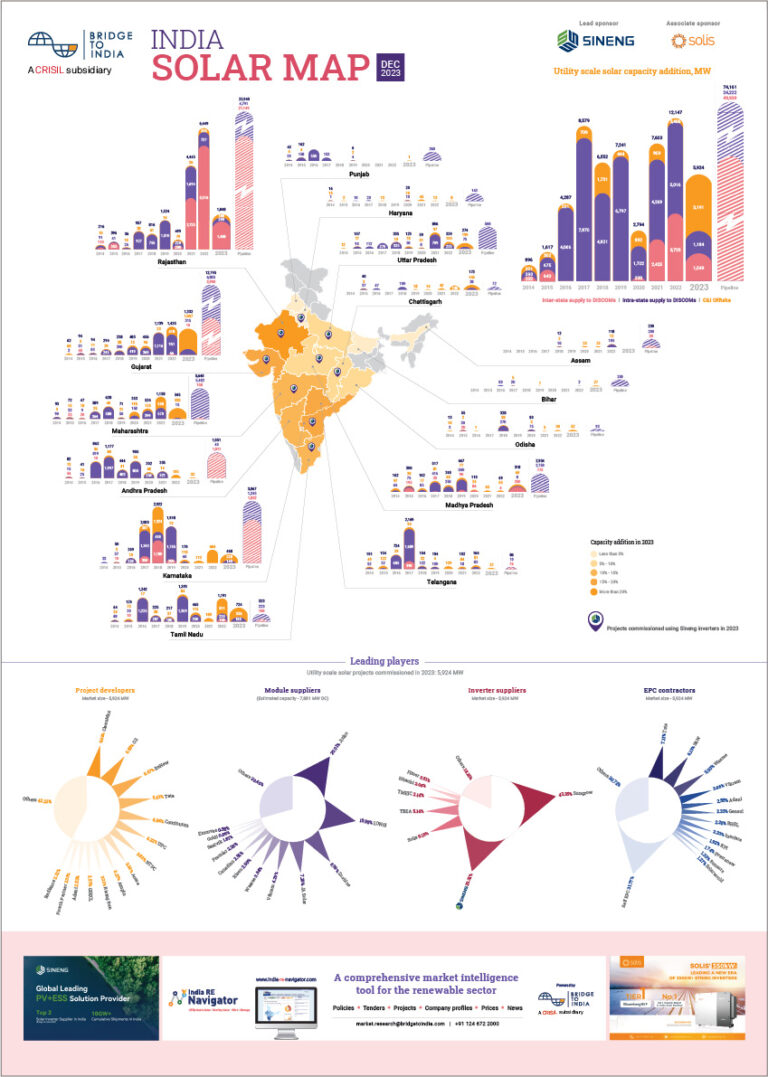As 2021 draws to an end, we look at major developments that shaped the renewable sector. It was a nervy year, beginning with a severe second COVID wave followed by an unexpected disruption in module supply chain sharply hitting project viability and execution. These are our top developments of the year and their impact on the sector.
Module prices shoot up
For the first time ever, module prices increased month on month through the whole year. After the lows of US cents 18/ W last year, mono-crystalline module prices went up steadily to US cents 25 through June and then shot up to US cents 30 as Chinese government clamped down on power consumption and shut factories. Expiry of safeguard duty in July eased the pressure only partly. Profitability of projects under construction was hit hard leaving developers with a tough choice – complete construction now with higher cost, renegotiate contracts where possible, or delay completion to next year at the risk of facing delay penalties.
Domestic manufacturing takes off
Border conflict with China and COVID strengthened the government’s resolve to boost domestic manufacturing. After years of dithering, a series of decisive moves on ALMM, BCD and PLI were announced to support manufacturing. The government appears keen to give a nod to all 18 bidders in the PLI scheme with an aggregated bid capacity of 54.8 GW. India could finally have 30-35 GW of cell and module manufacturing capacity and 3-4 fully integrated manufacturers in the next five years.
Reliance makes a smashing entry
Following up on its mega announcement in June, Reliance made a series of striking deals heralding its entry in the clean energy sector. The company would bring down costs for consumers and help accelerate overall sector growth with its unparalleled financial might, access to latest technology, scale, complete backward integration and large captive market. Manufacturing and installation businesses are set for a massive disruption.
Big target gets bigger: 450 GW of renewable capacity by 2030
At COP, the Prime Minister committed to ramp up non-fossil fuel based power generation capacity to 500 GW by 2030 and achieve net-zero emissions status by 2070. The revised target sits incongruously with on-the-ground scenario in terms of project execution (demanding), power demand (weak) and DISCOM finances (perilous). There is pressure now on the government to act explaining recent policy moves to extend IST waiver and liberalise C&I renewable market.
Foreign investors pile in
Large market size, liberal investment regime, hunt for yield and growing ESG investment theme have made India’s clean energy sector a magnet for capital providers. Easy liquidity conditions and falling cost of capital helped mitigate various operational and financial obstacles. There were notable new investments in the year by Total (Adani), Thailand’ PTT (Avaada), Scatec (Acme project), Augment (CleanMax), Norfund (Fourth Partner), SHV (SunSource), Copenhagen Infrastructure (AMP) and Omers (Azure), amongst others. ReNew successfully completed its US listing with a USD 610 million fund raise, while there were green bond issuances totalling USD 3.5 billion by Adani, ReNew, Azure, Continuum, Hero and Acme.
The DISCOM problem remains intractable
Financial condition of DISCOMs deteriorated even further as costs climbed up but state governments refused to hike tariffs. All key reform measures including the USD 12 billion liquidity injection scheme, a new USD 40 billion operational reform scheme, privatisation, delicensing and Electricity Act amendments failed to make any meaningful progress. Outstanding payments to power producers are near record highs with at least six states falling behind on payments to power producers by more than a year. Punjab became the second state after Andhra Pradesh to renegotiate tariffs on all operational renewable projects.
Table: Key developments in 2021 and their impact on value chain

It has been a momentous year for the sector. Despite major setbacks, the outlook is better than ever before and pace of energy transition continues to get stronger. We wish you a merry festive season and a very happy new year! Hope you have a restful break. We look forward to seeing you in 2022.












